Abstract
A patient with the syndrome of inappropriate antidiuretic hormone release (SIADH) following head injury and meningitis was studied during treatment with demeclocycline, a drug known to produce a reversible nephrogenic diabetes insipidus. No changes were observed during six days of demeclocycline 1200 mg/24 hr but urine output increased significantly, with the production of a dilute urine, when the dose was increased to 2400 mg/24 hr. The patient lost weight, and all biochemical features of the syndrome were rapidly corrected despite an unchanged fluid intake and despite the persistence of high plasma levels of ADH. The rise in serum sodium was accompanied by mild sodium retention, as measured by external balance and exchangeable sodium. A complication of treatment was the development of acute renal failure possibly induced by a nephrotoxic effect of high circulating levels of demeclocyline. On stopping demeclocyline renal function returned to normal and, after some delay, SIADH returned, and was still present 9 months after initial presentation. This confirms earlier reports of the efficacy of demeclocycline in SIADH; but the authors advise caution against increasing the dose above 1200 mg/24 hr.
Full text
PDF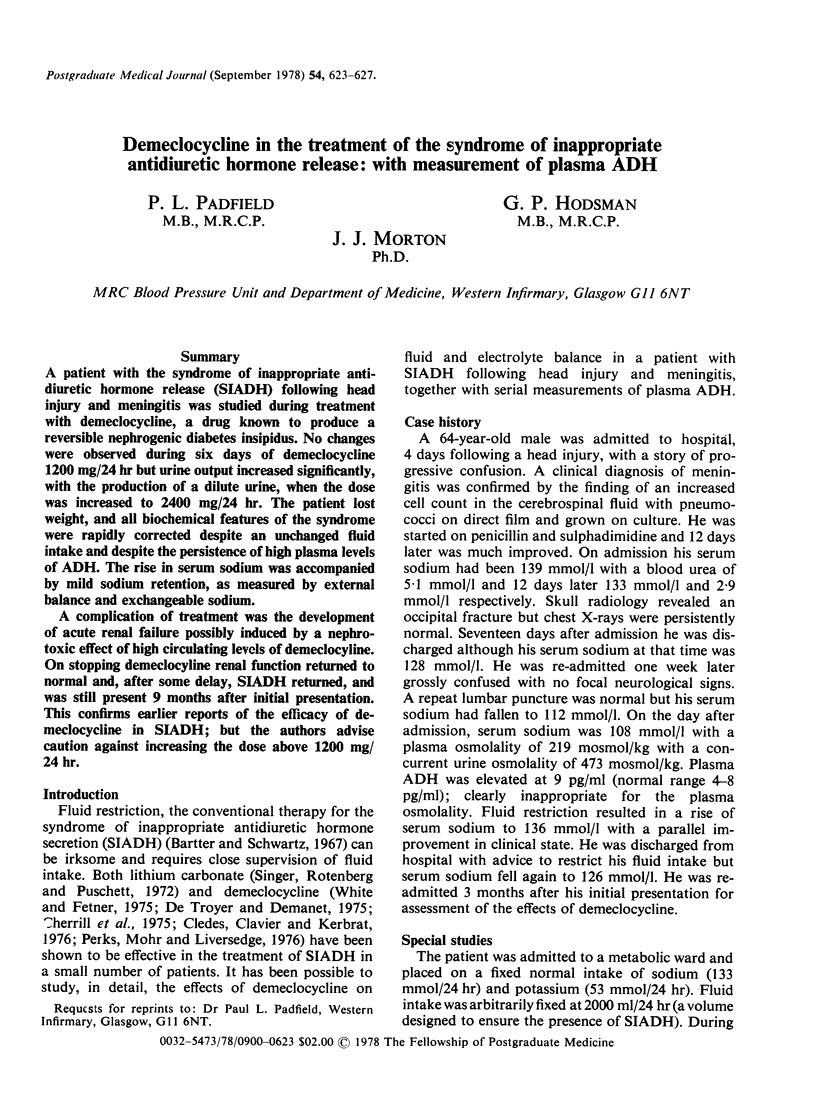
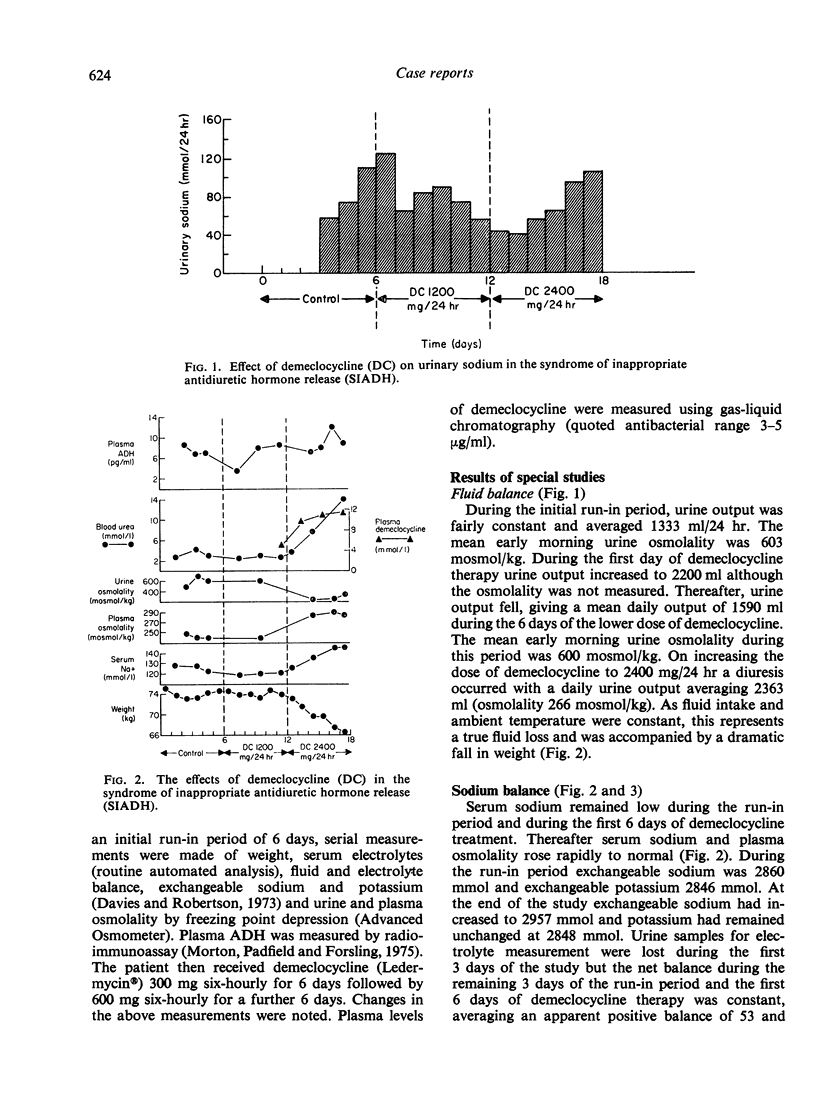
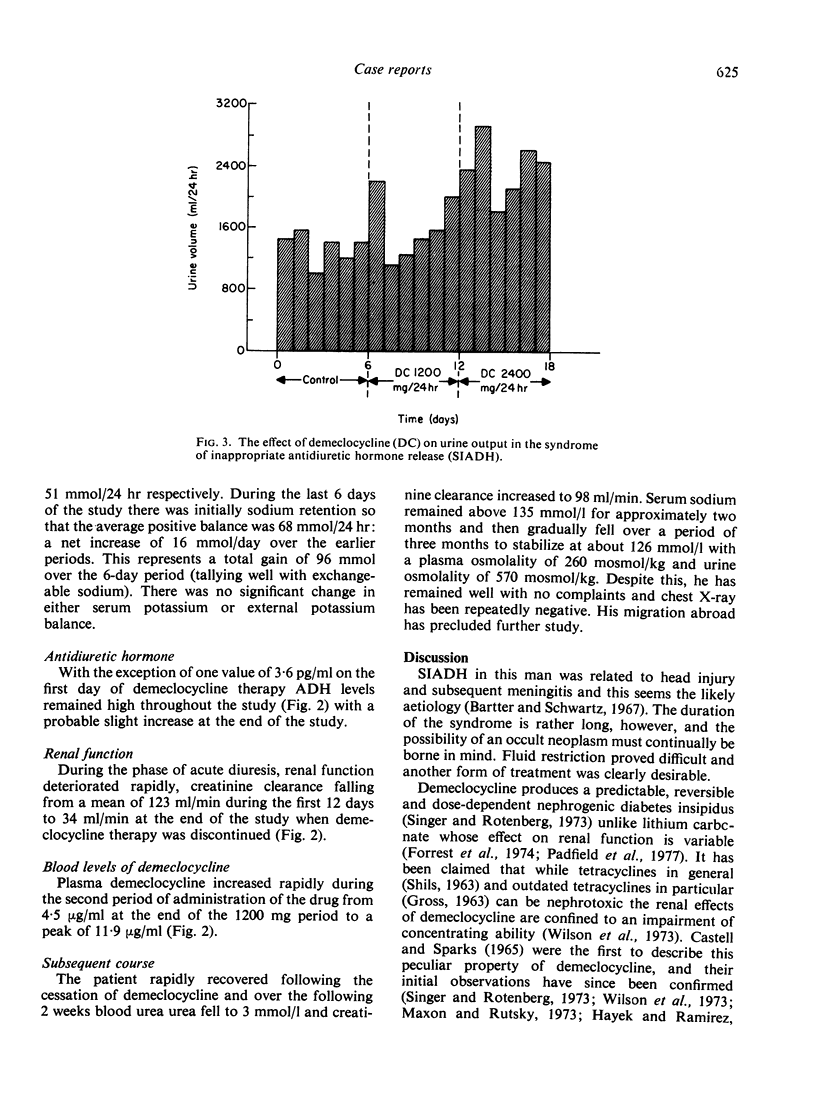
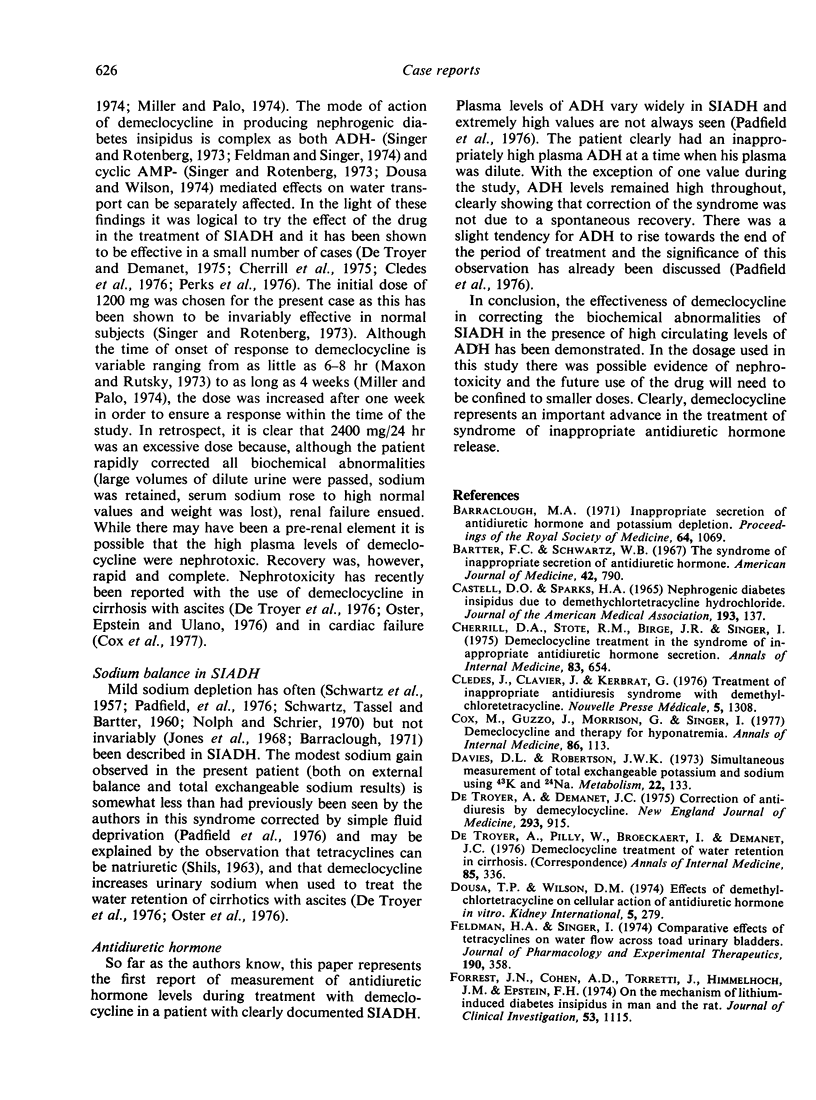
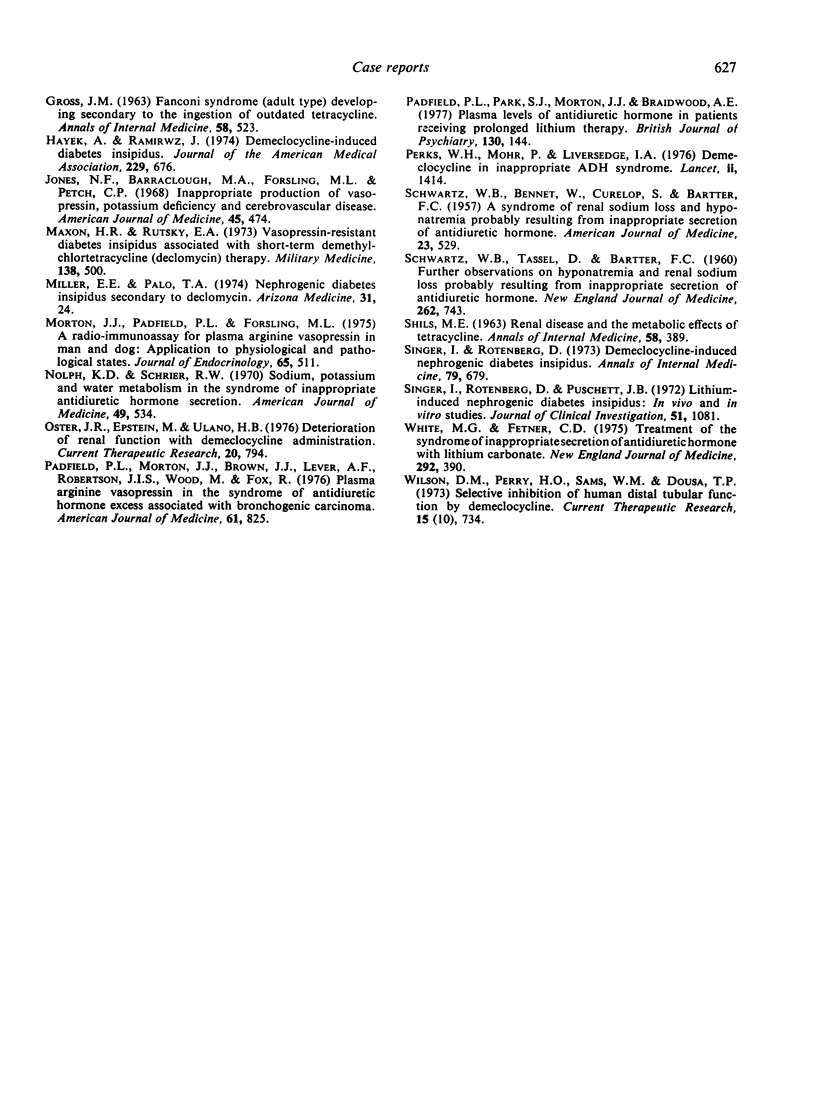
Selected References
These references are in PubMed. This may not be the complete list of references from this article.
- Barraclough M. A. Inappropriate secretion of antidiuretic hormone and potassium depletion. Proc R Soc Med. 1971 Oct;64(10):1069–1070. doi: 10.1177/003591577106401030. [DOI] [PMC free article] [PubMed] [Google Scholar]
- Bartter F. C., Schwartz W. B. The syndrome of inappropriate secretion of antidiuretic hormone. Am J Med. 1967 May;42(5):790–806. doi: 10.1016/0002-9343(67)90096-4. [DOI] [PubMed] [Google Scholar]
- Cherrill D. A., Stote R. M., Birge J. R., Singer I. Demeclocycline treatment in the syndrome of inappropriate antidiuretic hormone secretion. Ann Intern Med. 1975 Nov;83(5):654–656. doi: 10.7326/0003-4819-83-5-654. [DOI] [PubMed] [Google Scholar]
- Cledes J., Clavier J., Kerbrat G. Traitement d'un syndrome d'antidiurèse inappropriée par la déméthylchlortétracycline. Nouv Presse Med. 1976 May 15;5(20):1308–1309. [PubMed] [Google Scholar]
- Cox M., Guzzo J., Morrison G., Singer I. Demeclocycline and therapy of hyponatremia. Ann Intern Med. 1977 Jan;86(1):113–114. doi: 10.7326/0003-4819-86-1-113. [DOI] [PubMed] [Google Scholar]
- Davies D. L., Robertson J. W. Simultaneous measurement of total exchangeable potassium and sodium using 43 K and 24 Na. Metabolism. 1973 Feb;22(2):133–137. doi: 10.1016/0026-0495(73)90263-1. [DOI] [PubMed] [Google Scholar]
- De Troyer A., Demanet J. C. Correction of antidiuresis by demeclocycline. N Engl J Med. 1975 Oct 30;293(18):915–918. doi: 10.1056/NEJM197510302931809. [DOI] [PubMed] [Google Scholar]
- Dousa T. P., Wilson D. M. Effects of demethylchlortetracycline on cellular action of antidiuretic hormone in vitro. Kidney Int. 1974 Apr;5(4):279–284. doi: 10.1038/ki.1974.37. [DOI] [PubMed] [Google Scholar]
- Feldman H. A., Singer I. Comparative effects of tetracyclines on water flow across toad urinary bladders. J Pharmacol Exp Ther. 1974 Aug;190(2):358–364. [PubMed] [Google Scholar]
- Forrest J. N., Jr, Cohen A. D., Torretti J., Himmelhoch J. M., Epstein F. H. On the mechanism of lithium-induced diabetes insipidus in man and the rat. J Clin Invest. 1974 Apr;53(4):1115–1123. doi: 10.1172/JCI107649. [DOI] [PMC free article] [PubMed] [Google Scholar]
- GROSS J. M. Fanconi syndrome (adult type) developing secondary to the ingestion of outdated tetracycline. Ann Intern Med. 1963 Mar;58:523–528. doi: 10.7326/0003-4819-58-3-523. [DOI] [PubMed] [Google Scholar]
- Hayek A., Ramirez J. Demeclocycline-induced diabetes insipidus. JAMA. 1974 Aug 5;229(6):676–677. [PubMed] [Google Scholar]
- Jones N. F., Barraclough M. A., Forsling M. L., Petch C. P. Inappropriate production of vasopressin, potassium deficiency and cerebrovascular disease. Am J Med. 1968 Sep;45(3):474–479. doi: 10.1016/0002-9343(68)90081-8. [DOI] [PubMed] [Google Scholar]
- Maxon H. R., 3rd, Rutsky E. A. Vasopressin-resistant diabetes insipidus associated with short-term demethylchlortetracycline (declomycin) therapy. Mil Med. 1973 Aug;138(8):500–501. [PubMed] [Google Scholar]
- Miller E. E., Palo T. A. Nephrogenic diabetes insipidus secondary to declomycin. Ariz Med. 1974 Jan;31(1):24–27. [PubMed] [Google Scholar]
- Nolph K. D., Schrier R. W. Sodium, potassium and water metabolism in the syndrome of inappropriate antidiuretic hormone secretion. Am J Med. 1970 Oct;49(4):534–545. doi: 10.1016/s0002-9343(70)80048-1. [DOI] [PubMed] [Google Scholar]
- Oster J. R., Epstein M., Ulano H. B. Deterioration of renal function with demeclocycline administration. Curr Ther Res Clin Exp. 1976 Dec;20(6):794–801. [PubMed] [Google Scholar]
- Padfield P. L., Morton J. J., Brown J. J., Lever A. F., Robertson J. I., Wood M., Fox R. Plasma arginine vasopressin in the syndrome of antidiuretic hormone excess associated with bronchogenic carcinoma. Am J Med. 1976 Dec;61(6):825–831. doi: 10.1016/0002-9343(76)90406-x. [DOI] [PubMed] [Google Scholar]
- Padfield P. L., Park S. J., Morton J. J., Braidwood A. E. Plasma levels of antidiuretic hormone in patients receiving prolonged lithium therapy. Br J Psychiatry. 1977 Feb;130:144–147. doi: 10.1192/bjp.130.2.144. [DOI] [PubMed] [Google Scholar]
- Perks W. H., Mohr P., Liversedge L. A. Demeclocycline in inappropriate A.D.H. syndrome. Lancet. 1976 Dec 25;2(8000):1414–1414. doi: 10.1016/s0140-6736(76)91958-9. [DOI] [PubMed] [Google Scholar]
- SCHWARTZ W. B., BENNETT W., CURELOP S., BARTTER F. C. A syndrome of renal sodium loss and hyponatremia probably resulting from inappropriate secretion of antidiuretic hormone. Am J Med. 1957 Oct;23(4):529–542. doi: 10.1016/0002-9343(57)90224-3. [DOI] [PubMed] [Google Scholar]
- SCHWARTZ W. B., TASSEL D., BARTTER F. C. Further observations on hyponatremia and renal sodium loss probably resulting from inappropriate secretion of antidiuretic hormone. N Engl J Med. 1960 Apr 14;262:743–748. doi: 10.1056/NEJM196004142621502. [DOI] [PubMed] [Google Scholar]
- SHILS M. E. Renal disease and the metabolic effects of tetracycline. Ann Intern Med. 1963 Mar;58:389–408. doi: 10.7326/0003-4819-58-3-389. [DOI] [PubMed] [Google Scholar]
- Singer I., Rotenberg D. Demeclocycline-induced nephrogenic diabetes insipidus. In-vivo and in-vitro studies. Ann Intern Med. 1973 Nov;79(5):679–683. doi: 10.7326/0003-4819-79-5-679. [DOI] [PubMed] [Google Scholar]
- Singer I., Rotenberg D., Puschett J. B. Lithium-induced nephrogenic diabetes insipidus: in vivo and in vitro studies. J Clin Invest. 1972 May;51(5):1081–1091. doi: 10.1172/JCI106900. [DOI] [PMC free article] [PubMed] [Google Scholar]
- Troyer A., Pilloy W., Broeckaert I., Demanet J. C. Letter: Demeclocycline treatment of water retention in cirrhosis. Ann Intern Med. 1976 Sep;85(3):336–337. doi: 10.7326/0003-4819-85-3-336. [DOI] [PubMed] [Google Scholar]
- White M. G., Fetner C. D. Treatment of the syndrome of inappropriate secretion of antidiuretic hormone with lithium carbonate. N Engl J Med. 1975 Feb 20;292(8):390–392. doi: 10.1056/NEJM197502202920803. [DOI] [PubMed] [Google Scholar]


